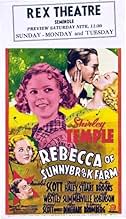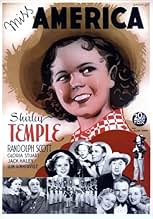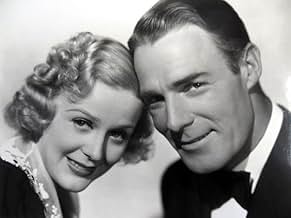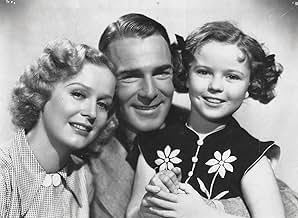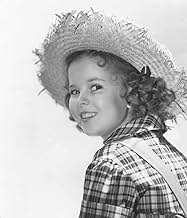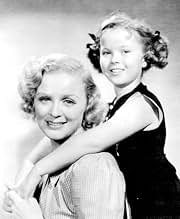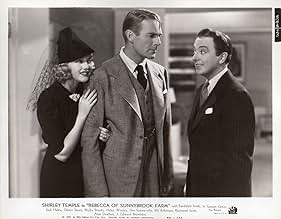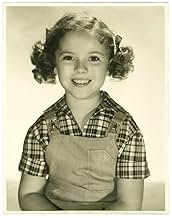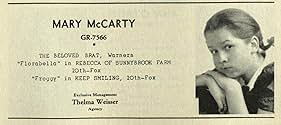NOTE IMDb
7,0/10
2 k
MA NOTE
Ajouter une intrigue dans votre langueRebecca's Uncle Harry leaves her with Aunt Miranda who forbids her to associate with show people. But neighbor Anthony Kent is a talent scout who secretly sets it up for her to become a radi... Tout lireRebecca's Uncle Harry leaves her with Aunt Miranda who forbids her to associate with show people. But neighbor Anthony Kent is a talent scout who secretly sets it up for her to become a radio broadcaster.Rebecca's Uncle Harry leaves her with Aunt Miranda who forbids her to associate with show people. But neighbor Anthony Kent is a talent scout who secretly sets it up for her to become a radio broadcaster.
- Réalisation
- Scénario
- Casting principal
- Récompenses
- 2 victoires et 1 nomination au total
Raymond Scott and His Quintet
- Raymond Scott and His Quintet
- (as Raymond Scott Quintet)
Clarence Wilson
- Jake Singer
- (as Clarence Hummel Wilson)
Avis à la une
A frantic radio producer must find the perfect Little Miss America for an advertiser's national program. He discovers her in his country neighbor, REBECCA OF SUNNYBROOK FARM, an incredibly talented & precocious moppet, who proceeds to charm all around her & bring happiness into the lives of those who love her.
Little Shirley Temple turns in another crowd-pleasing performance in this pleasant family film - which bears almost no resemblance to the Kate Douglas Wiggin classic. It's easy to see why the little tyke was Hollywood's top star for years. Her smile & vivacity are still stunning decades later.
This time Shirley is surrounded by a plethora of male talent: rugged Randolph Scott, giving a slightly wooden performance no doubt caused by the chagrin of playing second fiddle to a ten-year-old; peppy Jack Haley, always eager to please; veteran William Demerest, displaying some of his best pratfalls; laconic comic Slim Summerville, the unlikeliest lover; flustered Franklin Pangborn, as a very nervous organist; and the great Bill `Bojangles' Robinson, given distressingly little to do in his role as a farmhand - until the film's final moments when he gets to shine in a tap routine with Shirley.
Helen Westley is great fun as grumpy Aunt Miranda; lovely Gloria Stuart is given little to do except look, well, lovely.
That's champion character actress Eily Malyon as the Reverend's cake-eating wife. Movie mavens will recognize old Clarence Wilson as a shyster attorney.
Shirley sings `An Old Straw Hat' & `Come And Get Your Happiness', as well as a medley of her past hits.
Query: Why do film makers think radio audiences are thrilled by listening to tap dancing? In films like this you don't ask questions like that.
Little Shirley Temple turns in another crowd-pleasing performance in this pleasant family film - which bears almost no resemblance to the Kate Douglas Wiggin classic. It's easy to see why the little tyke was Hollywood's top star for years. Her smile & vivacity are still stunning decades later.
This time Shirley is surrounded by a plethora of male talent: rugged Randolph Scott, giving a slightly wooden performance no doubt caused by the chagrin of playing second fiddle to a ten-year-old; peppy Jack Haley, always eager to please; veteran William Demerest, displaying some of his best pratfalls; laconic comic Slim Summerville, the unlikeliest lover; flustered Franklin Pangborn, as a very nervous organist; and the great Bill `Bojangles' Robinson, given distressingly little to do in his role as a farmhand - until the film's final moments when he gets to shine in a tap routine with Shirley.
Helen Westley is great fun as grumpy Aunt Miranda; lovely Gloria Stuart is given little to do except look, well, lovely.
That's champion character actress Eily Malyon as the Reverend's cake-eating wife. Movie mavens will recognize old Clarence Wilson as a shyster attorney.
Shirley sings `An Old Straw Hat' & `Come And Get Your Happiness', as well as a medley of her past hits.
Query: Why do film makers think radio audiences are thrilled by listening to tap dancing? In films like this you don't ask questions like that.
It's almost strange to look at these "Shirley Temple films" at various stages of your own life. You view them differently as you grow older. It also depends, I suppose, on how familiar you are with 1930s films. Many of them are dated, especially with the language, songs and comedy of the period, so you have to acclimate yourself.
After a decade away from her films, I viewed this one recently and found both good and bad things about watching it. The positives, however, far outweighed the negatives and I believe this is one of Shirley's more entertaining efforts.
After starring now for about five years, it's obvious how comfortable she had become in her roles. She looked extremely confident in here and why not? She had her act down pat. She even performed one song that was medley of her hits from previous movies. Yup, she was a veteran at the ripe old age of 10 and at the peak of her career in the 1930s.
In this movie was the normal mixture of characters, meaning a crabby old woman, a nice young couple that you wanted to see get married, a couple of wacky cronies, good 'ole Bill Robinson nearby....and the regular happy ending. The wholesome and pretty woman in here was Gloria Stuart. She was the same lady who appeared in 1997's "Titantic.""
The leading man was western star Randolph Scott and the old biddy was Helen Westley. The goofballs were Slim Summerville, Jack Haley and William Demarest. This was one of the better casts in the Temple movies.
The only drawback, really, was the total lack of credibility, scene after scene of things that made no sense...such as an entire orchestra and chorus setting up inside a quiet farmhouse and the occupant (Westley) unaware of it??!!! There are a number of scenes that just leave you shaking your head in amazement. So....you just have to suspend all belief and just enjoy the comedy, Shirley's tremendous talent and appeal, and all the pleasing songs and dances in here. That done, you've spent an enjoyable 80 minutes.
Made during the Depression years when Americans desperately needed to feel good, Shirley Temple was perhaps the best at filling that need. Some 70 years later, she still ranks as the greatest child entertaining in United States history and her films still put a smile on one's face. She still makes us feel good.
After a decade away from her films, I viewed this one recently and found both good and bad things about watching it. The positives, however, far outweighed the negatives and I believe this is one of Shirley's more entertaining efforts.
After starring now for about five years, it's obvious how comfortable she had become in her roles. She looked extremely confident in here and why not? She had her act down pat. She even performed one song that was medley of her hits from previous movies. Yup, she was a veteran at the ripe old age of 10 and at the peak of her career in the 1930s.
In this movie was the normal mixture of characters, meaning a crabby old woman, a nice young couple that you wanted to see get married, a couple of wacky cronies, good 'ole Bill Robinson nearby....and the regular happy ending. The wholesome and pretty woman in here was Gloria Stuart. She was the same lady who appeared in 1997's "Titantic.""
The leading man was western star Randolph Scott and the old biddy was Helen Westley. The goofballs were Slim Summerville, Jack Haley and William Demarest. This was one of the better casts in the Temple movies.
The only drawback, really, was the total lack of credibility, scene after scene of things that made no sense...such as an entire orchestra and chorus setting up inside a quiet farmhouse and the occupant (Westley) unaware of it??!!! There are a number of scenes that just leave you shaking your head in amazement. So....you just have to suspend all belief and just enjoy the comedy, Shirley's tremendous talent and appeal, and all the pleasing songs and dances in here. That done, you've spent an enjoyable 80 minutes.
Made during the Depression years when Americans desperately needed to feel good, Shirley Temple was perhaps the best at filling that need. Some 70 years later, she still ranks as the greatest child entertaining in United States history and her films still put a smile on one's face. She still makes us feel good.
When adorable Shirley Temple gets dropped off, at her aunt's country farm, by her irresponsible uncle, she gets to know the simple life. Only life in the country isn't so simple. Her aunt, Helen Westley, has a decades-long feud with her old beau and neighbor, Slim Summerville. She refuses to speak to him, relaying messages through Shirley even when they're all in the same frame. Then there's the other neighbor, Randolph Scott, a handsome talent scout who's dating a radio singer, Phyllis Brooks. Jack Haley is in love with Phyllis, but she won't give him the time of day. And Gloria Stuart, Shirley's cousin, is trying to fight her feelings for Scottie.
In case that isn't complicated enough, Helen Westley is anti-show business, and Shirley's already auditioned for a Little Miss America radio contest! This is one of the more complicated Shirley Temple movies, which makes sense since she's growing up. She can handle more plot than Curly Top or Stand Up and Cheer. And supposedly, her audience can, too.
Shirley sings a few songs in this one, notably a medley of other songs she's performed in her older movies. While it is very cute for Shirley to sing a medley of her previous hits, it's also bittersweet. She's growing up, and she has to acknowledge that the days of her being a charming little tot are over. For her to "remind" us of her hits, it's also a reminder that those movies were a long time ago. For those who like a good story and lots of jokes sprinkled in the script, this might be your favorite Shirley Temple flick. Helen and Slim's feud is hilarious, and I always love Jack Haley. Scott and Stuart don't do much, but for no fault of their own; it's Shirley's show. Literally!
In case that isn't complicated enough, Helen Westley is anti-show business, and Shirley's already auditioned for a Little Miss America radio contest! This is one of the more complicated Shirley Temple movies, which makes sense since she's growing up. She can handle more plot than Curly Top or Stand Up and Cheer. And supposedly, her audience can, too.
Shirley sings a few songs in this one, notably a medley of other songs she's performed in her older movies. While it is very cute for Shirley to sing a medley of her previous hits, it's also bittersweet. She's growing up, and she has to acknowledge that the days of her being a charming little tot are over. For her to "remind" us of her hits, it's also a reminder that those movies were a long time ago. For those who like a good story and lots of jokes sprinkled in the script, this might be your favorite Shirley Temple flick. Helen and Slim's feud is hilarious, and I always love Jack Haley. Scott and Stuart don't do much, but for no fault of their own; it's Shirley's show. Literally!
Advertising man Randolph Scott is trying to cast a singing Little Miss America for a radio show, sitting in his office, while assistant Jack Haley deals with the stage mothers and their brats. When Shirley Temple sings, that's it, but there's a misunderstanding and everyone goes home. Miss Temple's stepfather, William Demarest has had enough, so he takes her to her aunt Helen Westley's farm, where she charms everyone, including next-door neighbor Scott. When he finds out that she's the girl he's wanted -- besides Miss Temple's cousin, Gloria Stuart -- joy reigns supreme, except for Mrs. Westley, who wants nothing to do with show business. So they arrange a secret hookup at Randolph's house. When Demarest hears her performance, dollar signs flash in his eyes.
Although I remember almost none of this from when I read Kate Douglas Wiggin's 1903 book, that was more than sixty years ago, so I trust I can be forgiven for that. As a movie, it strikes me as a confabulation of bits and pieces from other Temple movies, with a cast she was seen with before, and even a medley of her greatest hits. Still, the big final number has her dancing with Bill Robinson to the Raymond Scott Quintette playing "The Toy Trumpet", so what is there to complain about? With Slim Summerville, Alan Dinehart, J. Edward Bromberg, Paul Harvey, and Franklin Pangborn.
Although I remember almost none of this from when I read Kate Douglas Wiggin's 1903 book, that was more than sixty years ago, so I trust I can be forgiven for that. As a movie, it strikes me as a confabulation of bits and pieces from other Temple movies, with a cast she was seen with before, and even a medley of her greatest hits. Still, the big final number has her dancing with Bill Robinson to the Raymond Scott Quintette playing "The Toy Trumpet", so what is there to complain about? With Slim Summerville, Alan Dinehart, J. Edward Bromberg, Paul Harvey, and Franklin Pangborn.
Shirley Temple definitely deserved some of her popularity after this tailor-made vehicle. The film is as adorable as the young star. It follows Rebecca (Temple) as she tries to fulfill her dream of singing on a popular radio show. She does this with the help of a few adult friends who compliment Temple perfectly. Temple herself, shines in this film. Singing, dancing and acting she shows a natural talent for performing and clearly enjoys herself with this film. All in all I would recommend this film to anyone. It might not be the best Shirley Temple film but it will keep you entertained all the way through and the enchanting lead will captivate you.
Le saviez-vous
- AnecdotesBill Robinson visited Shirley Temple at an exclusive and restricted hotel to rehearse the "Parade of the Wooden Soldiers" number for this film. Temple later recalled, "I asked Bill what cottage he was staying in. He told me, 'I'm staying in the chauffeur quarters above the garage.' It wasn't until years later that I understood why."
- GaffesShirley Temple's stunt double, with her head turned away from the camera, is very obviously not Shirley, as she climbs down the ladder.
- Citations
[last lines]
Rebecca Winstead: I always told you I was very self-reliant.
- Versions alternativesIn 2005, a new colorized version appeared, prepared by Legend Films, replacing the older colorized version used for television and video.
- ConnexionsFeatured in Biography: Shirley Temple: The Biggest Little Star (1996)
- Bandes originalesHappy Endings
(1938) (uncredited)
Music by Lew Pollack
Lyrics by Sidney D. Mitchell
Sung by Phyllis Brooks
Meilleurs choix
Connectez-vous pour évaluer et suivre la liste de favoris afin de recevoir des recommandations personnalisées
- How long is Rebecca of Sunnybrook Farm?Alimenté par Alexa
Détails
- Durée1 heure 21 minutes
- Couleur
- Rapport de forme
- 1.37 : 1
Contribuer à cette page
Suggérer une modification ou ajouter du contenu manquant

Lacune principale
By what name was Mam'zelle vedette (1938) officially released in Canada in English?
Répondre


